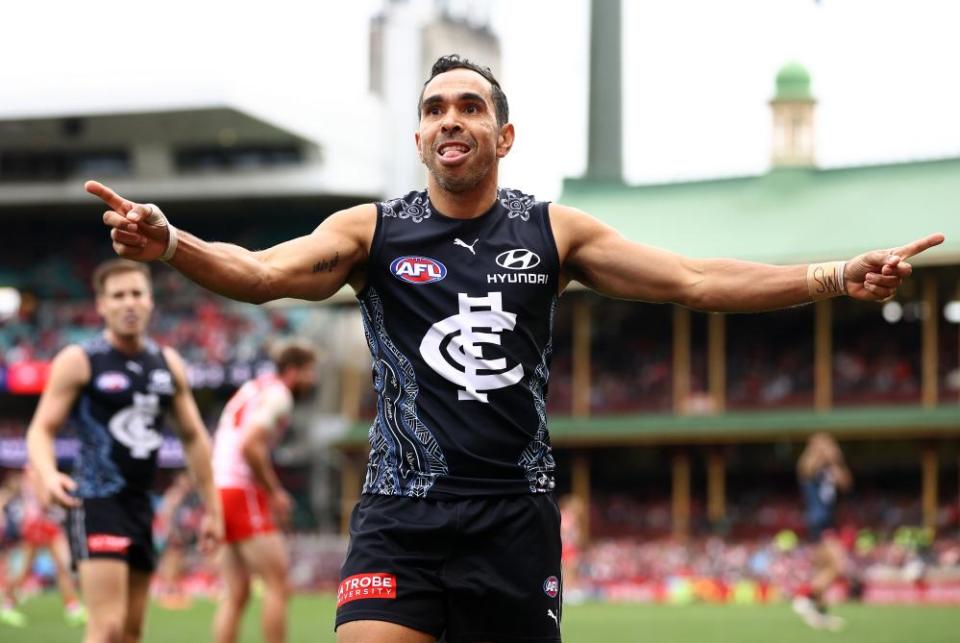AFL’s Indigenous round rhetoric can only do so much in equality push
As with all things at the mercy of time, Sir Doug Nicholls Round has come and gone. Naively it is a weekend when followers of Australia’s national game can pause and reflect on the enormous contribution of its Indigenous contingent. Cynically it is a box the AFL knows it must tick and a nice chance for clubs to flog another guernsey.
Formerly Indigenous Round, the annual event is now into its 15th year and fourth under its present nomenclature. But what is the round actually about? Inclusion? Recognition? Celebration? Atonement? At any one time it is each of these things and none of them. Now in its adolescence, the question must be asked if Sir Doug Nicholls Round is doing what is says on the tin. For the other 51 weeks of the year, the answer is probably no.
To its credit the AFL knows where the narrative should rest. “Sir Doug Nicholls Round is more than just a celebration of the brilliant skills on the field,” chief executive Gill McLachlan said last week. “The round is an opportunity to continue to listen and learn from First Nations players and staff at all levels of the game.” It is one thing to say the right words and another to live them. The reality is the code, from its followers to its participants, still has a way to go if its Indigenous cohort is to be considered equal.
Related: AFL 2021: Demons bounce back to bury Dogs – as it happened
We are still living in an age when arguably the sport’s biggest club is scrambling to eradicate systematic racism from its ranks. We are still living in an age when another club is forced to explain why one of its black players is casually subjected to groping and belittlement. We are still living in an age when players of colour cannot escape discrimination from spectators at games or bigots online.
Again, the game’s ruling body sees this and understands its import. After a spate of abuse directed at players last year, McLachlan noted it was “incredibly disappointing and demonstrates that we need to do so much more as a society to educate and hold racist behaviour into account”. So why isn’t the message getting through?
Professional sport loves a poster boy and that is what the AFL needs. Rhetoric can only do so much. Sometimes the paying public needs to put a singular face to the plight of many. All and sundry need look no further than Eddie Betts.
Betts is a man who has confronted more anguish in his young life than is acceptable. For doing no more than fronting up for work and doing what he does exceptionally well, he has been abused online, in person and had bananas thrown at him by ignoramuses not fit to share the same planet with him.
It is treatment that has worn down others who have gone before. The bullying and vilification was too much for Adam Goodes, a two-time Brownlow medalist who was betrayed by his chosen sport. Goodes doesn’t revel in Australian football anymore. He doesn’t do interviews and is never seen in the stands watching the game he once loved. The hideousness of racism, and the blind eye of administration, denied Goodes what is rightfully his: pride in retirement. He is now a man who can’t even stomach the sport.

The story of Goodes is a national disgrace but one that can lead to better things with the ilk of Betts carrying the baton. “I’ve always said this is a week about education,” the Carlton forward said on Fox Footy last Friday. “About educating yourself, educating your family, educating your friends and starting that conversation so we can all move together as one. As I speak racism still does exist and it is still here.”
Betts’s brand of education is as brilliant as his skills with a Sherrin. He doesn’t condemn racism by condemning racism but by living a good life. He is a fellow who can’t, and won’t, be beaten by arseholes. When he gets called an ape, he doubles down on his existential philosophy by smiling wider and shining a light by virtue of his deeds.
Last year, in the week AFL players united to support the global Black Lives Matter movement, one sub-human thought it appropriate to tweet a picture of Betts alongside a monkey. Instead of responding in kind, Betts took the higher ground that so effortlessly becomes him. “We each have a responsibility to ourselves and each other,” he said. “To continue to listen. To learn. To educate.”
Against Sydney on Sunday, during which his unique and breathless talents were again on display, Betts equalled Andrew McLeod in third place for most games played by an Aboriginal and/or Torres Strait Islander. He is a treasure of sport and a treasure of the nation. He is also the AFL’s greatest weapon in the fight against racism.

 Yahoo Sport
Yahoo Sport 





































